
Pittsview, Alabama, home to 1,000 people, has a corner store, a clutch of churches and an abandoned train depot. Emporia, Virginia, population 5,500, has a casino, strip malls and truck stops. They're the sort of forgotten communities that make up much of rural America. But if you want to understand the depth of the economic rivalry between the 21st century's two superpowers, the US and China, they're good places to start.
The two towns sit on opposite sides of a years long tariff battle over mundane product the global economy needs to keep moving: shipping container trailers. The 1950s invention of the 40-foot steel container revolutionized international shipping and helped supercharge globalization. Once those boxes hit land, they have to be attached to a trailer chassis— essentially a long, skeletal bed frame with wheels—so trucks can haul them, and the products inside, across the country.
During the pandemic supply chain mess, a shortage of trailers left stacks of containers stranded at ports, contributing to the inflation surge and cost-of-living crisis that became a political liability for President Joe Biden and still hangs over the US economy and this year's election.
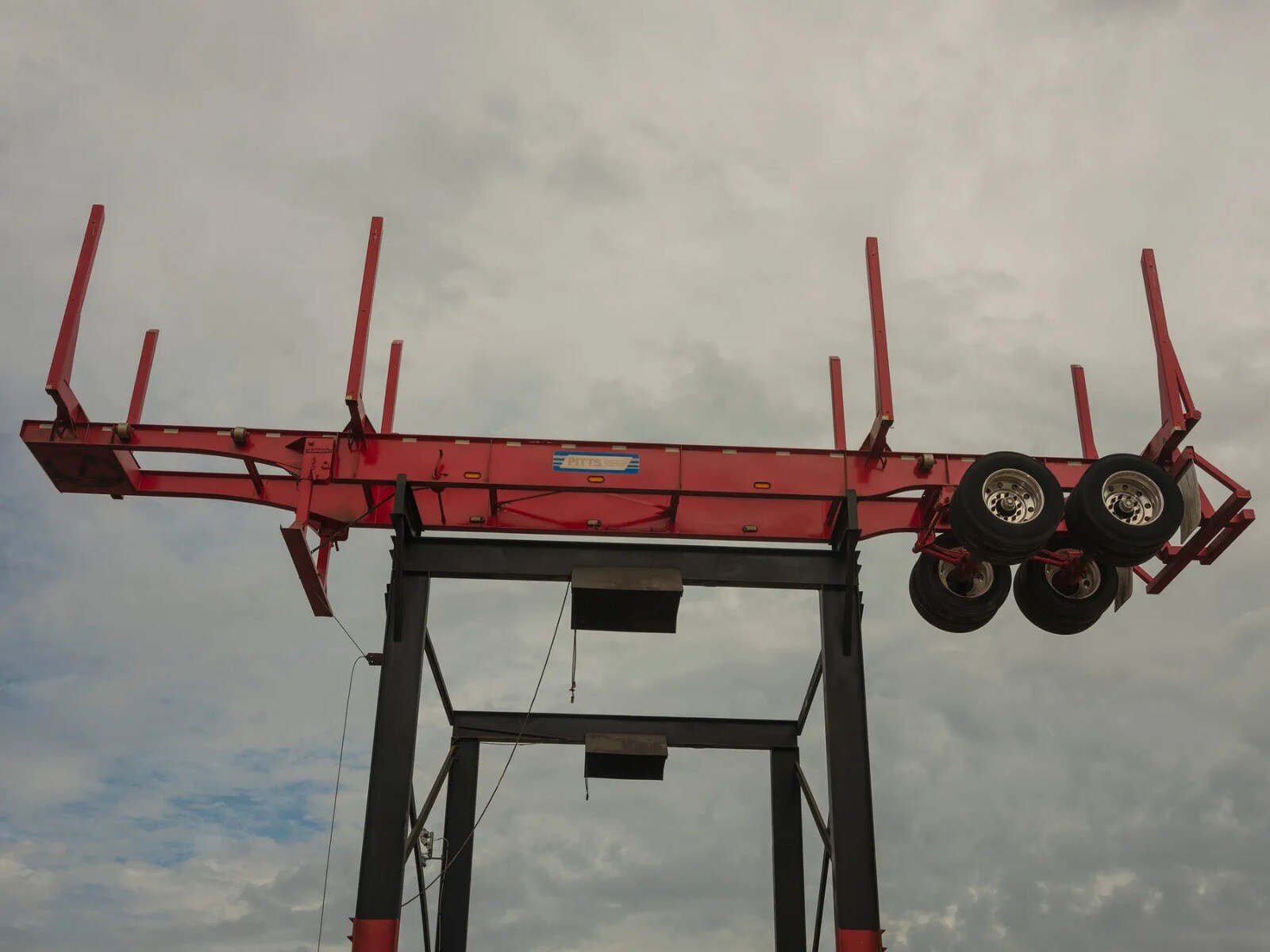
A Pitts Enterprises trailer.
(Photographer: Matt Eich for Bloomberg Markets)
Pittsview and Emporia both have chassis plants that have made them central to a fight over tariffs on Chinese- manufactured trailers that's ended up raising questions about who gets to fly the “Made in America” flag and avoid import taxes. The conflict isn't political in the blue-state versus-red-state sense—in a rare case of bipartisanship, Democrats and Republicans generally back tariffs to reduce reliance on China in critical areas like logistics. Republican Donald Trump's election in 2016 and the support he drew from hollowed-out factory towns helped upend what had been a decades-old Washington consensus supporting free trade.
Having slapped tariffs on everything from steel to Scotch whisky, Trump is repeating the script as he runs for reelection, proposing a 10% to 20% tariff on all imports that would be imposed above yet more duties on imports from China.
His Democratic opponent, Vice President Kamala Harris, has dubbed it the equivalent of a national sales tax that would raise costs for the middle class. But the Biden administration kept Trump's China tariffs and sought to limit the country's access to advanced chip technologies, policies Harris appears set to maintain if she wins in November.
As most economists will tell you, tariffs are a messy business that usually result in the consumer paying the price. The story of Pittsview and Emporia shows just how surprising the consequences can be for the industries supposedly being protected.
The Pitts name looms large over Pittsview. Pitts Enterprises Inc.'s headquarters sits in a restored 19th century home with rocking chairs on its porch that once belonged to William Pitts, one of the town fathers. The community is occasionally mistaken for a ghost town because of a pair of
single-story brick buildings—one a former bank and the other carrying the legend Pitts & Sons—that appear abandoned along the main drag. Just up the road, there's the busier Pittsview Corner Market, where patrons can gas up and eat Krispy Krunchy chicken.
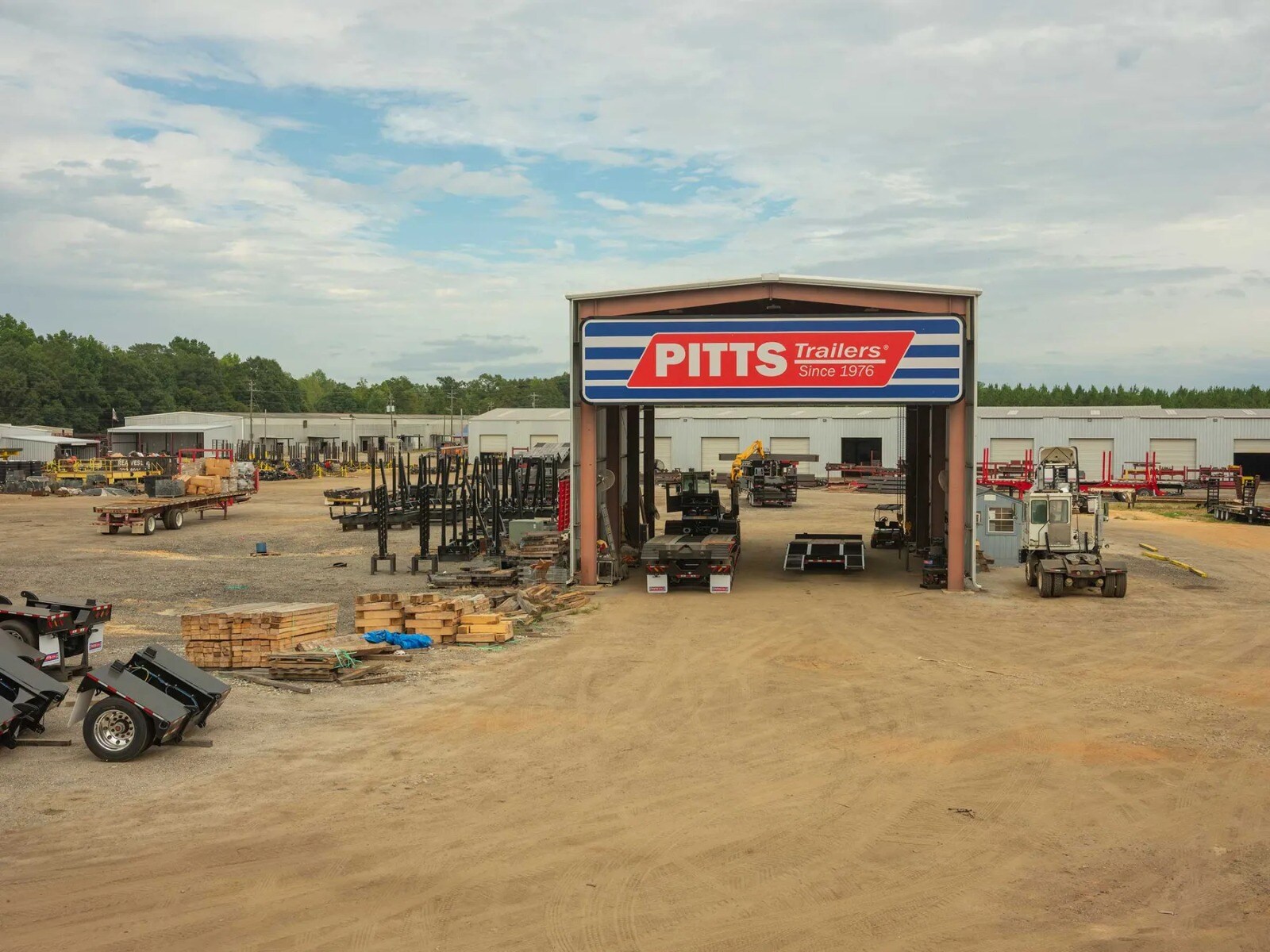
The Pitts Enterprises factory in Pittsview.
(Photographer: Matt Eich for Bloomberg Markets)
Like many properties in Pittsview, the vacant buildings are owned by members of the family that gave its name to the town, as is Pitts Enterprises, one of the largest employers in rural Russell County. Andrew Pitts founded the company in 1976 to build trailers for the local forestry industry and ran it until 2002 when his son, Jeff Pitts, the current owner and chief executive officer, took control.
Pitts makes trailers of its own design in its sprawling factory yard a mile from its headquarters. Axles, tires and other parts pile up around metal factory buildings, whose huge doors, when rolled open to move material in and out, expose the workers inside to the elements. Inside, along with robots and other machines, sit stacks of steel plates. They're welded into
I-beams to form the rigid backbone of trailers and bent, cut and shaped into other “subassemblies” such as the running gear that holds the axle, or the neck that connects the trailer to the truck.
“It is a rough, dirty job,” says Dustin Preslar, who started at Pitts over a decade ago as a welder and worked his way up to plant manager. “It's hot in the summer, cold in the winter.”
The company got into the chassis market in 2017 and started selling 40-foot trailers under its Dorsey Intermodal brand. But according to JP Pierson, Pitts' president, the expansion soon stumbled because of intense Chinese competition. By 2018, as cheap Chinese trailers flooded the market, Pierson says Pitts was shut out. “It really didn't matter how low I went on the price,” he says. “I was not competitive.”
So in July 2020, Pitts and four other US trailer manufacturers filed a petition in Washington seeking punitive tariffs on chassis made by state-owned Chinese container giant China International Marine Containers Group Co., or CIMC. At its height, in the years leading to the pandemic, CIMC, a heavyweight in the global market for shipping containers, sold
more than 45,000 new trailer chassis annually in a US market of 70,000 to 80,000. And because of well-documented subsidies on electricity, steel and other essentials used to make the chassis, the Chinese company sold them at a price that local manufacturers said they couldn't match.
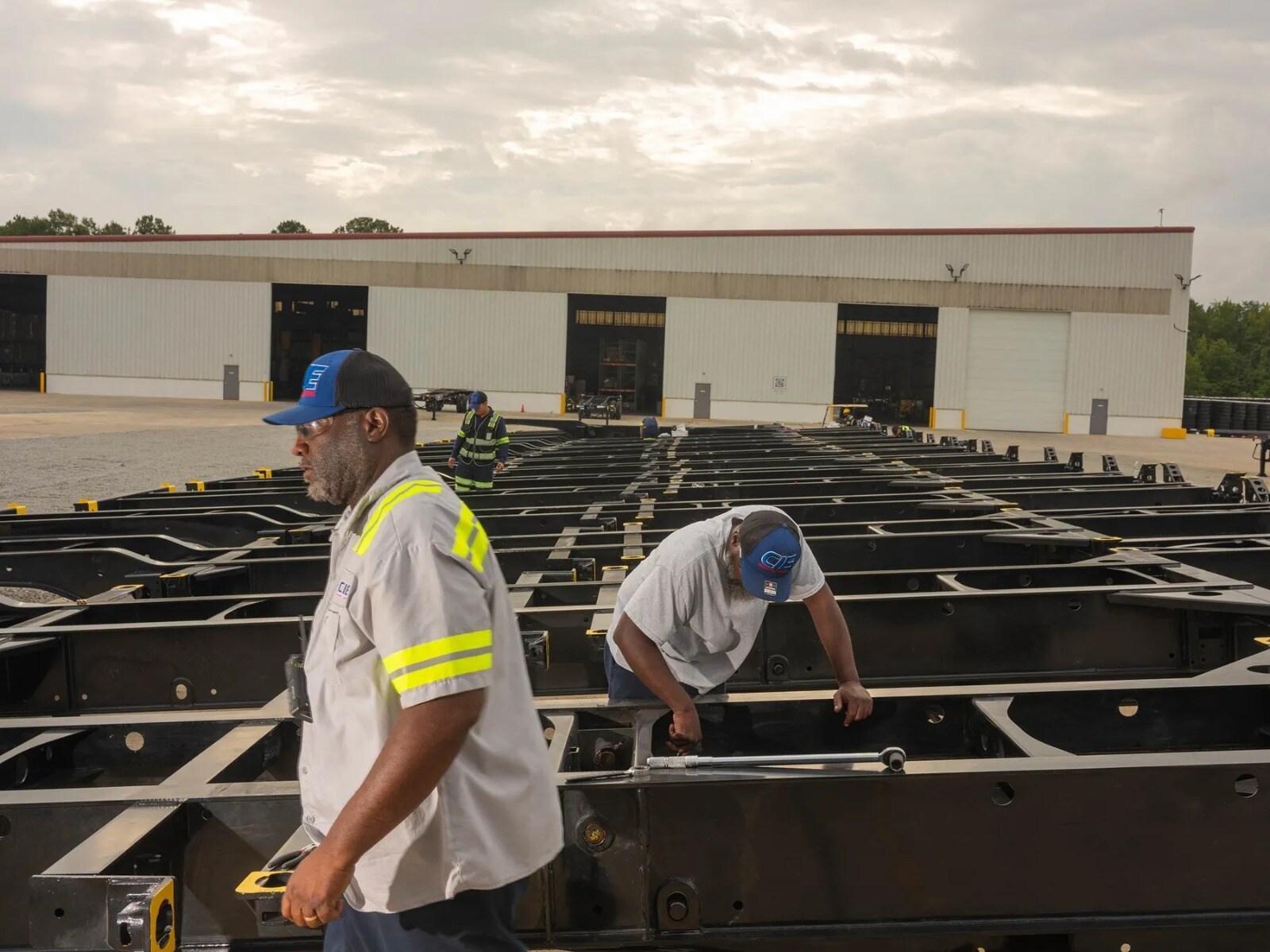
Workers outside Chinese-owned CIE Manufacturing in Emporia, Virginia.
(Photographer: Matt Eich for Bloomberg Markets)
Within less than a year, the US companies had won their case. By May 2021 the government was finalizing tariffs of more than 220% on Chinese trailers, in addition to the 25% duties established during the Trump administration. A chassis from China that might have sold for $10,000 suddenly cost almost $35,000. Imports halted, leaving a hole in the market just as the economy suddenly needed a lot more trailers.
Domestic manufacturers cheered and pledged to ramp up production and hire hundreds of new workers. Trucking companies and port operators, meanwhile, complained that the new duties and the end of chassis imports were making their now acute supply chain problems even worse. Millions of American consumers were suffering to save a few thousand jobs, pundits complained. That October, US chassis manufacturers pushed back and implored Biden to keep the tariffs in place. Making trailers in the US should be a national priority, they argued, because CIMC's dominance threatened economic security.
“The problems at America's ports are systemic and in par are as a result of allowing China to dominate the supply of equipment that supports America's supply chain,” they wrote in a letter to the president, who was already seeing his approval rating slide as inflation climbed. The Biden administration kept the tariffs in place.
Business was looking up for Pitts. But what came next illustrates how tariff fights rarely have tidy endings. China-owned CIMC first set up shop in Emporia in January 2015 to serve East Coast ports and logistics hubs. At its height the company brought almost 100 jobs paying $18- to $20-per-hour
to a place that still offers limited opportunities beyond working at the local Walmart or the Boar's Head plant making processed meat. (The factory shut down indefinitely after a fatal food poisoning outbreak over the summer.) CIMC's two single-story buildings stand between an underused four-lane highway and train tracks a few minutes from Interstate 95. The
port of Norfolk, a customer, is a 90-minute drive. A company next door makes bulletproof glass for the military.
As it became clear the new duties were coming, CIMC renamed its American subsidiary CIE Manufacturing. The rebrand included a red, white and blue logo featuring an eagle and a website touting models with patriotic American names like the Pioneer and the Revere. It invested more than $20 million in creating a non-China supply chain to comply with the rules. The company used a plant in Thailand to make frames with steel from Europe and South Korea. Once shipped to CIE's expanded plants in California and Emporia, the frames were combined with axles manufactured in Frankfort, Kentucky, landing gear (or retractable legs) used to hold up resting trailers made in Muskegon, Michigan, and suspension kits produced in Springfield, Missouri.
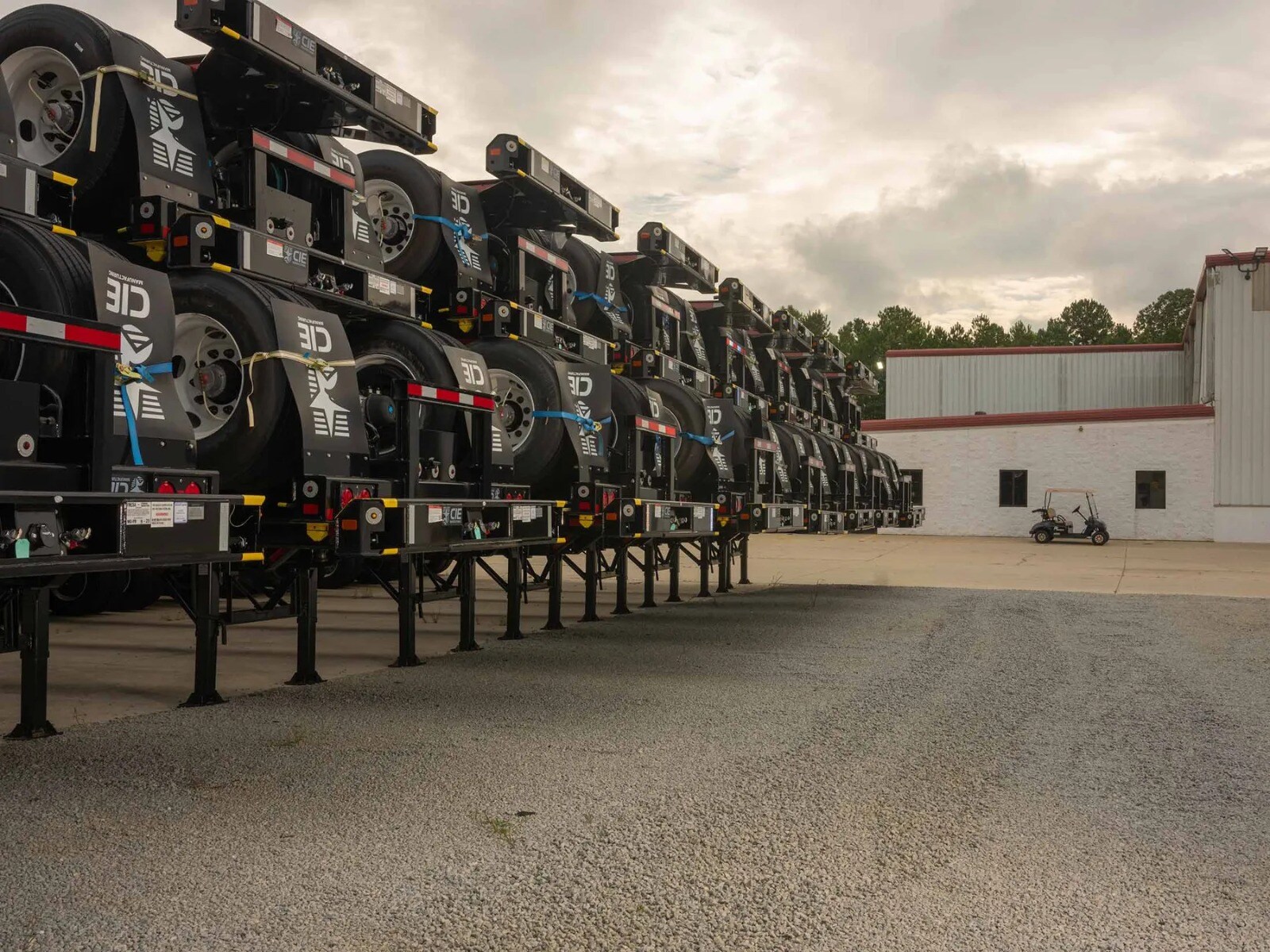
CIE chassis.
(Photographer: Matt Eich for Bloomberg Markets)
Trevor Ash, the plain-spoken Canadian who serves as CIE's chief executive officer, likens what CIMC did to Japanese carmakers' response to US import barriers in the 1990s. Companies such as Honda Motor Co. and Toyota Motor Corp. built factories in the US and created thousands of American jobs. By 2023, CIE employed some 400 people at its two US plants. “We've
done what's been asked of us,” Ash says. “We're creating lots of jobs here.”
As it was retooling its business, CIE executives discovered something about one of the rivals that pushed for the tariffs: Alabama-based Pitts Enterprises was importing thousands of chassis from Truong Hai Group Corp., a privately held Vietnamese company that makes cars, buses and trucks for the likes of Kia, Mazda and Peugeot.
With CIMC's trailers knocked out of the market, Pitts had orders from customers to import almost 18,000 chassis made by its Vietnamese partner over a roughly 16-month period. CIE suspected that the chassis included parts and raw materials, mainly steel, from China. Which meant they ought to be subject to the very same tariffs Pitts had lobbied to have put on CIMC's old Chinese-made chassis.
So in 2022, CIMC, which remains CIE's corporate parent, lodged a complaint with US Customs and Border Protection, leading to an investigation. By March 2023, Customs ruled that Pitts' Vietnamese trailers contained enough Chinese components to be subject to the new tariffs—a decision that Pitts hotly contests. It was a bombshell for Pitts, which faced a tariff bill worth tens of millions of dollars for the thousands of
chassis already imported, not to mention millions more in lost revenue.
“It's put a pretty good crunch on our company,” says Pierson, Pitts' president, who insists the company did nothing wrong. The Customs ruling wiped out $250 million of expected gross revenue for a company that usually clears $50 million annually, he says. It was forced to defer a plan to invest as much as $15 million to improve efficiency and add more state-of- the-art equipment for its workforce of 300.

Pierson.
(Photographer: Matt Eich for Bloomberg Markets)
Pitts, having just profited from protectionism, was suddenly paying a heavy price in its name. The same coalition that had sought the original tariffs
against Chinese chassis decided that the best defense was a good offense. Pitts and the four other US manufacturers filed a new complaint with Customs against CIE. A month after Customs investigators released their Pitts finding, the agency announced it was launching another investigation.
CIE's Thailand plant was a front to mask the shipment of Chinese-made trailers to the US, the rival companies argued. And just like that, CIE was facing another damaging probe and millions of dollars in potential tariffs. By August 2023 it had suspended imports of new frames to avoid having to pay tariffs into escrow while the investigation proceeded, and it started to
pare back production in the US.
Jarvis Hicks landed at CIE in early 2022 after jobs greeting customers at Walmart and at a chain restaurant where he lasted only three weeks. By October 2023 his hours had been cut as the plant slowed to about half its capacity of as many as 30 chassis a day. The company eliminated temporary positions, but, mindful of post-pandemic labor shortages, CIE avoided layoffs for the 62 remaining permanent staff by reducing hours, leaving employees like Hicks restless. “I don't like it, to be honest,
because I'm used to working all day,” he says.
Ash and other CIE executives insisted the company would becleared. Customs investigators made a scheduled visit to the Thai plant in December 2023, but the investigation dragged on until April. CIE was deemed not guilty of tariff evasion and given the all-clear to get back to work. But the damage had been done. The company had laid off most of its Virginia workers in January. In June the Emporia plant ran out of frames to turn into chassis. When the last one was finished, Jose Perez, the
plant's operations manager, stood and watched with colleagues. “Everybody was sad,” Perez says. They wanted to know when work
would pick up again.
By the end of July, Hicks was among the last two dozen people with reduced hours at the plant and was fatalistic about what might come next. “If this is what's going on with the business, I mean there's nothing we can really do about it,” he says. The plan was to ramp up production again in September, but amid a trucking recession and what's now a glut of chassis built up in response to unprecedented pandemic demand, the market for
trailers had cratered. For both the CIE employees in Emporia and the Pitts workers in Pittsview, everyone seemed to be losing.
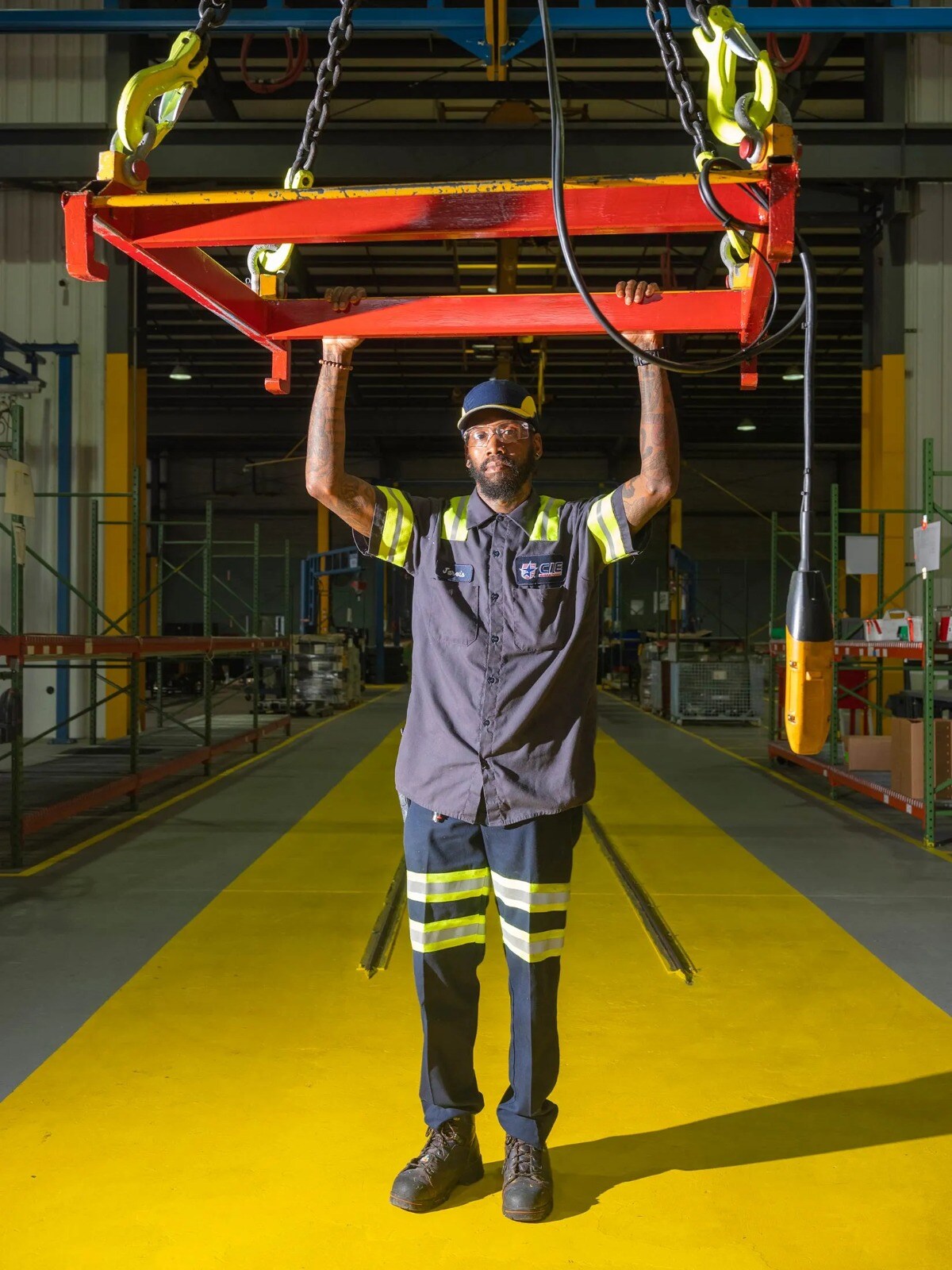
Jarvis Hicks, working at the CIE plant.
(Photographer: Matt Eich for Bloomberg Markets)
As the name implies, what happens to Pitts matters to Pittsview and the region. Almost 80% of workers in Russell County commute to jobs outside the county, according to the Alabama Department of Labor, with many traveling to Columbus, Georgia. A fifth of Russell County's population lives below the poverty line. “Jeff Pitts and what he does up there are huge for Barbour and Russell counties,” says Phil Clayton, director of economic development at the Eufaula Barbour County Chamber of Commerce.
Pitts is still fighting the 2023 Customs decision and has sued the government in federal court, arguing that Customs misinterpreted the tariff. He is being penalized by a system that was supposed to protect US producers from a state-owned Chinese company, he says. “They've turned it around and used it against us,” Pierson says. “That's a fight bigger than a company in Pittsview, Alabama, can do by itself.”
The anti-dumping and subsidy duties levied on trailer chassis in 2021 were imposed as part of a mechanism allowed under international trade rules rather than presidential whim. The US has long been the most aggressive user of that system, with Chinese goods increasingly in the firing line. But things changed when Congress in 2015 passed a law allowing any “interested party” to trigger investigations into tariff evasion. That led to tit-for-tat fights like the one between Pitts and its Chinese-owned rival.
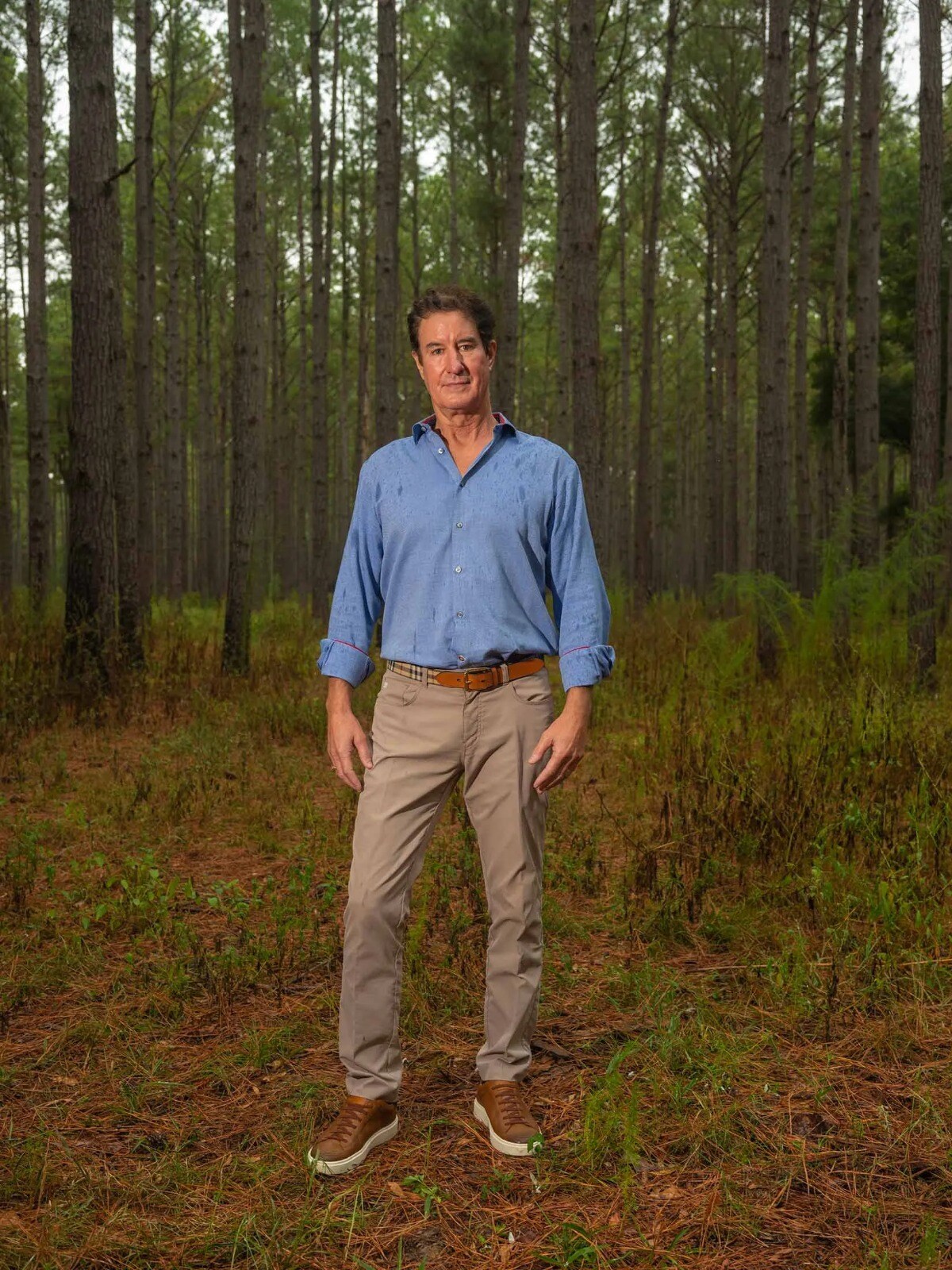
Jeff Pitts.
(Photographer: Matt Eich for Bloomberg Markets)
What's happening at Pitts in Alabama is also weighing on Greensville County, a 10-hour drive north along I-95. The county ranks among Virginia's poorest and has struggled for years to attract manufacturing jobs. The area has so far missed out on the boom in new construction for electric vehicle and battery plants, which have sprung from the Biden administration's embrace of green energy and industrial policy.
Ash says Customs rules mean companies like his are effectively considered guilty and liable for duties until cleared. The investigation into CIE took more than a year, and the slowdown and eventual production halt cost the company more than $100 million in missed revenue. Or as Ash puts it: “Two hundred-plus American families lost their jobs.” Donnan, who covers economics, and Allison, who reports on politics, are based in Bloomberg's Washington bureau.
Essential Business Intelligence, Continuous LIVE TV, Sharp Market Insights, Practical Personal Finance Advice and Latest Stories — On NDTV Profit.




















